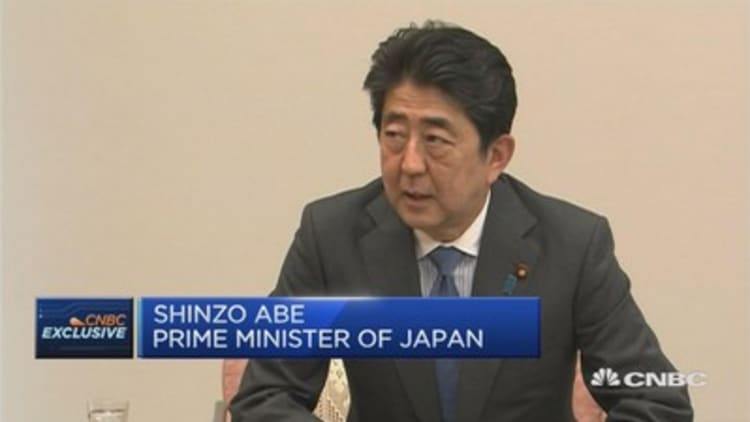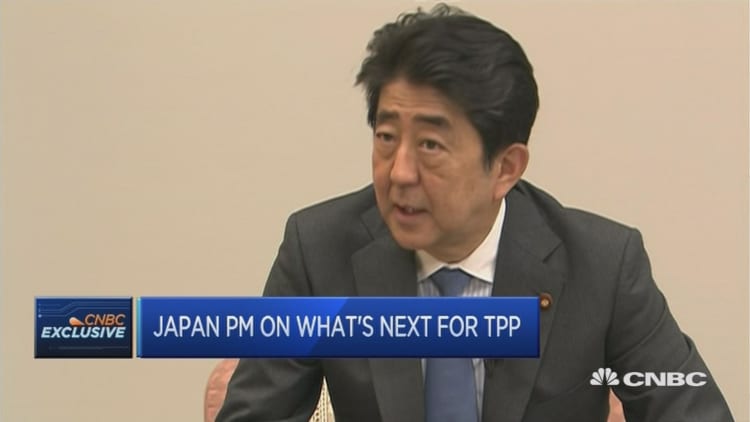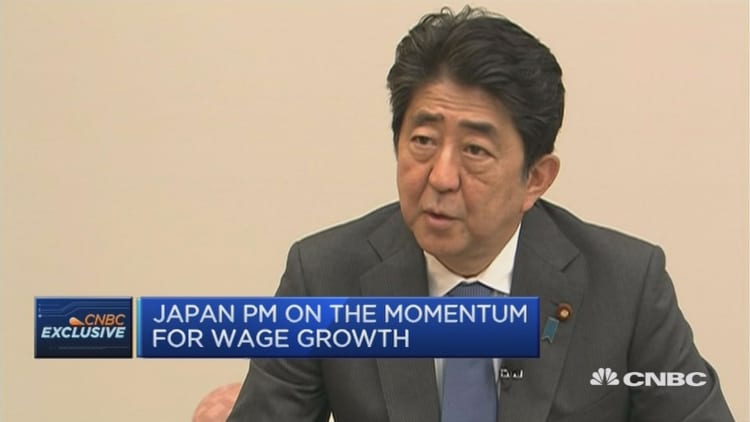



In an exclusive joint interview with CNBC and Broadcast Satellite Japan this week, Japanese Prime Minister Shinzo Abe offered his thoughts on an array of topics from North Korea to his country's demographic challenges.
Below are key snippets, translated from Japanese, from the interview.
Enhancing Japan-US ties
Plans are underway to create a framework for an economic dialogue between the U.S. and Japan, Abe said. Following Vice President Mike Pence's April meeting with Japanese Deputy Prime Minister Taro Aso, a second round of meetings on the topic will be held later this year, he added.
"We would like to enhance economic activities between Japan and the United States based upon trading and investment rules....In addition, we will have sectoral cooperation approaches in the domains of high speed rail, infrastructure and energy."
Economic relations will be boosted in a multifaceted way, the PM noted.
"In the past, friction was the word symbolizing the economic relations between the two countries. However, now we are living in the day and age of where no one party will make just a one-sided gain or one-sided losses," he said. "With the cooperation, both parties will be benefit from enhanced economic relations."
Strengthening Japan-China-Korea alliance
Japan's relationships with South Korea and China have been uneasy in recent years amid a territorial dispute in the East China Sea and continued anger over Japan's conduct during World War II. Still, Abe expressed a desire to conduct respective summit talks with Chinese President Xi Jinping and newly-elected South Korean President Moon Jae-in at the upcoming G-20 summit in Hamburg.
He said he hopes to hold a tripartite summit between the three countries in Japan as early as possible now that Seoul's political situation has stabilized, adding that he had spoken to Moon over the phone.
Why Japan isn't joining AIIB
The PM listed several reasons why Tokyo isn't a party to the China-backed Asian Infrastructure Investment Bank (AIIB).
"First of all, there remains the issue of whether impartial governance can be established. Secondly, there is the issue of sustainability of debt servicing on the part of the borrowing countries and whether the societal and environmental impacts are duly considered."
As long as these issues remain unresolved, Abe said he did not see his country taking part.
Tech can help Japan's aging problem
A rapidly aging society and a shrinking labor force could cause a 1 percentage point decline in average annual gross domestic product over the next three decades, according to the IMF.
"Going forward, with the utilization of artificial intelligence and the internet of things, we want to overcome the challenges coming from an aging society with low fertility," Abe said.
"We have already accumulated data and with the use of AI, we will make good use of the big data that we have. Thereby, we can contribute to other countries and regions, which may suffer from the same kind of challenges."
Abe refereed to this problem-solving concept as "Society 5.0" and used the medical field as an example: "With the use of big data and AI, we can shift to health management and preventive medical care and encourage those dependent on medical and nursing care to become more self supporting."
The use of robots and sensors can also alleviate the caregiver's burden, the PM noted.
Japan to lead TPP talks
Amid Washington's exit from the international trade deal, Japan must take a leadership role and move Trans-Pacific Partnership discussions forward, Abe stated.
While Tokyo strongly wishes for the U.S. to return to the trade pact, the eleven remaining members must not lose momentum and should "capitalize upon the results of long years of efforts," Abe said.
Tokyo appreciates Trump's North Korea stance
The international community has so far failed to convince Pyongyang to abandon nuclear development, so President Donald Trump's approach of "having all options on the table" is welcomed, Abe said.
Acknowledging that the rogue nation's nuclear threat had entered a new stage, the PM said Japan would like to resort to diplomatic and peaceful means in resolving the situation.
"However, we are not pursuing dialogue for the sake of dialogue. We must firmly and solidly stand upon the principle of action for action," he warned.
Japanese wages will head higher
Abe's administration has long hoped higher corporate earnings would translate into improved salaries and cue customers to spend more, but recent data have yet to show meaningful wage growth.
Going forward, however, the current tightness in the labor market will boost salaries, according to the PM.


